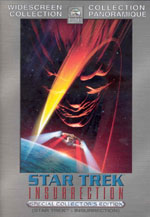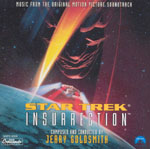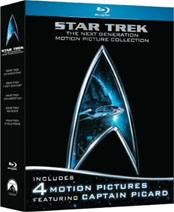
STAR TREK:
Star Trek Movies:
|
Star Trek 9: Insurrectionstory by Rick Berman and Michael Pillerscreenplay by Michael Piller feature film, 103 minutes
Perhaps one of the best reasons for ranking this film higher than its predecessor is that you don't have to be in the mood to stomach horror and face your fears in order to enjoy it in the same way that the previous film required you to. You can come to this one in just about any mood you want. Perhaps we have our star and associate producer Patrick Stewart to thank for this story pathway, because he reportedly steered the creative team away from repeating the theme of darkness that had hung over the three previous films. Nice move; we didn't need the re-run as much as the change of tone. Besides, a society of high philosophy should produce good dramas of lighter tone equally if not more often. "Insurrection" manages to deliver a gripping one here. Good job.
"Your Directive apparently doesn't include spying on other cultures."Early on, we repeat the imagery of the duckblind from the Prime Directive tour-de-force third season TNG episode "Who Watches the Watchers", and take that imagery to new heights with invisibility suits. Nicely, Data gets a great entrance ripping down all of that deception and secrecy, substituting a truth that will have to be dealt with during the drama of the rest of the film. Excellent start.Before long, we also see a repeat of an idea from another key Prime Directive TV episode, this time the seventh season's "Homeward" and its use of a flying holodeck to transport pre-contact civilizations to a new planet without them realizing that they've gone anywhere. Perhaps the imagery associated with this idea is a bit more obscure and more altered from its TV counterpart, delivering some spectacular visuals and plot dynamics. Whether or not part of this film's plan was to reconstruct the Ba'ku village identically on their destination planet is a point never really explored here, and hadn't been necessary in "Homeward". As the Prime Directive gets discussed in this film, you can see it is first and foremost being used to label the pre-contact protocols used with a society that has not achieved warp-drive capability. But once it is realized that the Ba'ku are beyond that consideration, at least in their social equality, most of the other considerations of non-interference, trade agreements, respect for land claims, etc., all of which are shown to also be a part of the Prime Directive on the Next Generation show (its first season was full of examples), are all ignored by Admiral Dougherty and his supporters on the Federation council. In fact, he claims that the directive should not apply because the Ba'ku are not actually indigenous to this planet that they colonized. Good, but big deal - it only means that we're thinking on our feet instead of falling back on pre-defined rules. If you look at the portions of Prime Directive that these villains choose to side with, they're all about maintaining secrecy, while it's the Enterprise and crew that follow honesty against the directive and respect alongside the directive. It's not hard to root for the Enterprise crew in this one, since they are in line with good principles all the way. But the concept of improving the Prime Directive to allow it to stick with honesty at all times is ultimately not an avenue that this film explores, which is a bit sad since they were almost there. Oh well. There's still a ton of good stuff in this film....
Many early scenes are worthwhile in the long run due to nice payoffs later on in the film, and become more palatable on repeat viewing when you know where these nuances are going. But encountering them for the first time, one is forced to wonder why the camera is choosing to show these things to us, and it mistakenly feels like the film has a lack of focus. For example, Picard later comments on how desirable the Ba'ku's slower pace of life is, which the audience easily believes, thanks to the hectic, over-scheduled nature of the activities we see the Enterprise crew involved with in the opening scenes. But those activities appear to have no importance to the movie when we first see them. The conversation with the blue-skinned Bolian that gets aborted before going anywhere is a prime example. If we have to wait 40 minutes to get a clue as to why a moment like this has been scripted, it should be re-written as something that can stand on its own while its greater purpose comes along later to add depth to it. Many more examples of this are apparent. Having two conversations going at once during Worf's first appearance takes away from the sense that the movie knows what it's doing and where it's going. There are perhaps a bit too many references to the various territorial conflicts that Deep Space Nine was heavily occupied with, while the explanation for Worf's presence is unintelligibly cast-off into the corner of the room. Some of the shifts in tone as various people decide to play or stop playing different pieces of music also seem to lack a certain finesse. Sadly the Next Generation crew are quick to leap into song as well, with the jarring tone of "A British Tar" grating badly against the usual tastes of their science fiction audience. Yes, this pays off with some great humorous moments both with Worf in the moment and with Data later on, but this doesn't seem to be enough to justify the length of the singing that appears on screen. It's all about knowing where your excellence is, and putting your emphasis on the right things. Still, I think the singing here is far better motivated than what we get in the next film, where the payoff is without humour and only serves to prove that too many film writers are trying to copy the temporary we-didn't-really-mean-it type of death that Star Trek II pioneered. Ho hum. The action beats on the planet work nicely, giving the film a great energy and probably the most outstanding scenery of any Star Trek film yet. However, once the gang make it to the caves, the film has a hard time creating anticipation that the plot will advance anywhere interesting. This is partly because Picard and company have pretty much achieved the objective of their trek and aren't sure where they are going next, partly because the cave interior scenery reminds one of so many TV episodes where plots stalled in caves to pad out screen time and it appears that the same is happening here, and partly because the fantastic plot twists that eventually do come all spring from Picard and Anij getting captured instead of doing anything proactive on their own. Better would have been some kind of discovery made in the caves that could lead or motivate Picard and Anij to get up to the Son'a ship by their own design. But in the end, these are all minor nits, most of which vanish during subsequent viewings of the film when you already have an idea of all the excellent twists and beats that the characters get to go through. This is undoubtedly the most humorous and fun of the Next Generation crew's feature films, and also the most romantic, with the playful rekindling of Riker and Troi's relationship making far better viewing than their mournful wedding in the next picture, and with tasteful sparks flying between Picard and Anij as well. Also very enjoyable are the debates between Patrick Stewart and Anthony Zerbe, which allow Stewart to take one of the strongest attributes of his character from the TV show and display it proudly on the big screen. This is what put Picard ahead of Kirk in my list of favourite Star Trek captains, and it is done better justice here in this feature film than in any of the others. Visually, this is quite an exquisite film, from the natural location, to the location enhanced by Herman Zimmerman's constructed village, to the beautifully unique outer space vistas of the cloudy reddish "Briar Patch" and its ringed planets. We get our share of space battles in this story, which seem a bit wordy like the television show, but the visuals this time around help keep these manoeuvres looking unique and, quite frankly, as gorgeous as the rest of the picture. Nice. And when all is said and done, I think this film stands on its own better than the previous one. "First Contact" feels more like part of an essential bigger franchise. "Insurrection" is a great film that also happens to belong to a great franchise.
Read the next Star Trek review: "Star Trek 10: Nemesis"
Star Trek 9 is available in various incarnations on DVD and Blu-Ray. Click on the Amazon symbol for the desired disc format and location nearest you for pricing and availability:
Article written by Martin Izsak. Comments on this article are welcome. You may contact the author from this page:
|
||||||||||||||||
|
| |||||||||||||||||

LYRATEK.COM |
|
||||||||||||||||



 from the U.S.
from the U.S. from Canada
from Canada from the U.K.
from the U.K.




